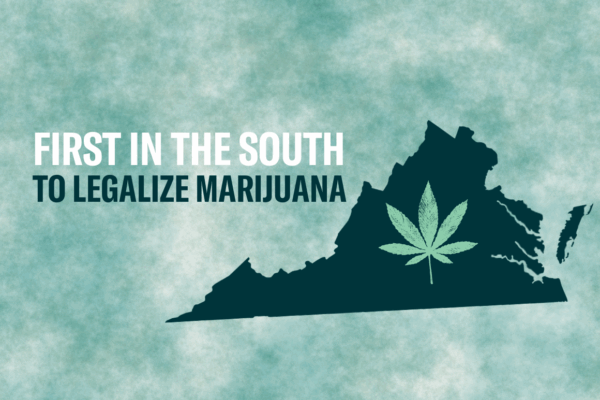This op-ed was originally published in The Washington Post on April 8, 2021.
Ashna Khanna is legislative director of the ACLU of Virginia. Chelsea Higgs Wise is executive director of Marijuana Justice. Valerie Slater is executive director of RISE for Youth. Bryan Kennedy is policy director of Justice Forward Virginia.
Our organizations joined forces two years ago to not just legalize marijuana in Virginia but also to change the way people talk about legalization. When the General Assembly approved the final amendments to the marijuana bills on Wednesday and put legalization over the finish line, we celebrated. But we are keenly aware of the faults in these bills and know that our work is far from over.
We are pro-legalization for one simple reason: Marijuana laws are racist. Our goal of changing the conversation around marijuana came about because Black Virginians are four times more likely than White people to be arrested for simple possession. Racial disparities run through every step of the criminal legal system, from the police stop to conviction to length of sentence. If you’ve heard your lawmakers make a pitch for marijuana legalization, you’ve probably heard a similar argument. In our effort to move the conversation away from White stoner culture to one of racial equity, we succeeded.
There are tangible policies and programs that will repair some of the harm against mainly Black and Brown communities by the failed War on Drugs. One of our top asks was to legalize simple possession (less than one ounce) on July 1, knowing that the legal retail market will take longer to set up. Even after marijuana was “decriminalized” last year, Black people were disproportionately stopped and charged with marijuana offenses, and making simple possession legal will end this racist policing tool. Initially, this wasn’t part of the legalization plan, but after a lot of public pressure, the governor seemed to have a change of heart and amended the bills.
The bills also set up a Cannabis Equity Reinvestment Fund, which will invest money in communities most harmed by the failed War on Drugs and support people impacted by harsh marijuana law enforcement as they try to get employment in the new legal market. Businesses owned or staffed by people with previous marijuana possession convictions will be prioritized for licenses. The amount of tax revenue flowing into this fund is too minimal to be fully effective and should be increased, but the infrastructure of this policy will help over-policed communities gain a share of the industry’s economic growth. Overseeing the legal market will be an independent cannabis authority — another product of our advocacy — to ensure that these policies and programs are working properly.
So, what’s the catch? These bills create new crimes, and, yes, we expect them to be enforced more harshly on Black and Brown people, just like every other marijuana law. Instead of continuing to enforce existing driving under the influence laws, there are new laws around “open containers” and driving while smoking. These laws may seem like common-sense approaches, but, in practice, they give police a pass to stop Black people without cause. Black Virginians know all too well that even routine traffic stops can turn violent through no fault of our own. If a Black person is driving while smoking tobacco, he or she will not be breaking any laws, yet he or she could easily be pulled over by a cop who wants to inspect the cigarette. If that person has legally purchased weed in the car, the cop could use the new open-container law to search the car and look for evidence of any wrongdoing — all because of a cigarette. Pretextual stops by police are often like IRS audits: Once they start digging, they don’t stop until they’ve found something.
The new marijuana laws also treat youths more harshly than adults. People under 18 who are caught with less than an ounce of weed will be adjudicated as juvenile delinquents and charged with a Class 2 misdemeanor if caught on school grounds, meaning they will be introduced into the criminal legal system and have criminal records. So, if a high-schooler gets caught at school with a joint he or she found in a parent’s bedroom, that teenager could be criminally convicted and denied opportunities such as college scholarships and a good-paying job for something that is legal for adult use. Rather than feeding the school-to-prison pipeline, we should address the root causes of youth drug use and give young people more opportunities for growth.
Rather than feeding the school-to-prison pipeline, we should address the root causes of youth drug use and give young people more opportunities for growth.
We shouldn’t gloss over the fact that legalizing marijuana in Virginia is a major step forward, and that prioritizing racial equity at any level is even more historic. The collective power of our movement has shifted policy in a meaningful way, and we must use our momentum to keep pushing for more equitable laws. When the General Assembly reconvenes for the 2022 legislative session, we all need to be ready to hold members accountable. Many lawmakers promised us that they would legalize marijuana right. Until marijuana is no longer a tool for racist policing, and until our youth are given services over sentences, that promise is unfulfilled.

